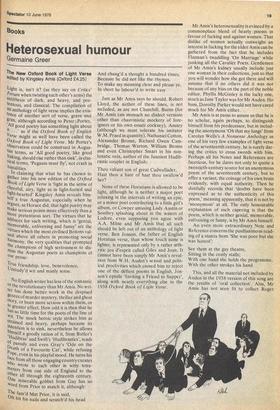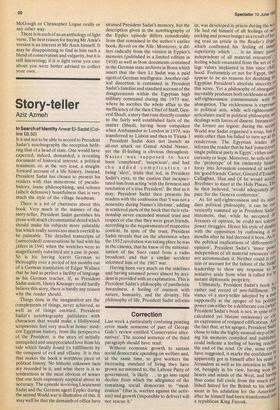B oo ks
Heterosexual humour
Germaine Greer
The New Oxford Book of Light Verse edited by Kingsley Amis (Oxford £4.25)
Light is, isn't it? (as they say on Crake Forum when twisting each other's arms) the antithesis of dark, and heavy, and portentous, and classical. The compilation of an anthology of light verse implies the existence of another sort of verse, grave and grim, although according to Peter .Porter, All good poetry has something light about It • • as if the Oxford Book of English Verse might as well have been called the Oxford Book of Light Verse. Mr Porter's Observation could be construed in Augustan terms, as 'All good poetry, like good baking, should rise rather than sink', in classkal terms, 'Pegasus must fly', not crash in banalities.
In claiming that what he has chosen to
gather into his new edition of the Oxford Book of Light Verse is 'light in the sense of cheerful, airy, light as in light-footed and light-hearted' Kingsley Amis reveals him
self a true Augustan, especially when he argues, as Horace did, that light poetry may
Make serious points more effectively than a More pretentious sort. The virtues that he adduces for such writing, which is 'genial, Memorable, enlivening and funny' are the virtues which the most civilised Britons valUed above all others in promoting social harmony, the very qualities that prompted the champions of high seriousness to dismiss the Augustan poets as champions of Our prose:
True friendship, love, benevolence, Unstudy'd wit and manly sense.
No English writer has less of the romantic or the revolutionary than Mr Amis. No writer has done better work in the despised genres of murder mystery, thriller and ghost story, or been more serious within them, or M greater effect. How odd it is then that he haS so little time for the poets of the line of Wit. The mock heroic style strikes him as strained and heavy, perhaps because its 'Mention is to sink, nevertheless he allows iihrnself a goodly ration of it, from Butler's Hudibras and Swift's 'Hudibrastics', scads °I parody and even Gray's 'Ode on the Death of a Favourite Cat', while refusing 1:°Pe, even in his playful mood. He turns his 'ace from all those engaging country curates vvho wrote to each other in witty tetrameters from one side of England to the
her all through the eighteenth century. °tie miserable gobbet from Gay has no Word from Prior to match it, although: The fam'd Mat Prior, it is said, Oft bit his nails and scratch'd his head And chang'd a thought a hundred times, Because he did not like the rhymes. To make my meaning clear and please ye, In short he labour'd to write easy Just as Mr Amis says he should. Robert Lloyd, the author of these lines, is not included, as are not Churchill, Burns (for Mr Amis can stomach no dialect versions other than chauvinistic mockery of foreigners or his own ersatz cockney), Anstey (although we must tolerate his imitator W.M. Praed in quantity), Nathaniel Cotton, Alexander Brome, Richard Owen Cambridge, Thomas Warton, William Brome and even Christopher Smart in his nonlunatic vein, author of the funniest Hudibrastic couplet in English: Thou valiant son of great Cadwallader, Hast thou a hare of hast thou swallow'd her?
None of these Horatians is allowed to be light, although he is neither a major poet
relaxing in the intervals of writing an epic, or a minor poet contributing to a little girl's album, or Cowper amusing Lady Austin or
Southey splashing about in the waters of Lodore, even supposing you agree with A.A. Milne and Mr Amis that all such should be left out of an anthology of light verse. Ben Jonson, the father of English Horatian verse, than whose touch none is lighter, is represented only by a rather arthritic jeu d'esprit called Giles and Joan. It cannot have been simply Mr Amis's revulsion from W.H. Auden's sexual and political proclivities which caused him to reject one of the deftest poems in English, Jonson's epistle `Inviting a Friend to Supper', along with nearly everything else in the 1938 Oxford Book of Light Verse.
Mr Amis's heterosexuality is evinced by a commonplace blend of hearty poems in favour of fucking and against women. That dislike of women actually outweighs an interest in fucking for the elder Amis can be gathered from the fact that he includes Flatman's twaddling 'On Marriage' while junking all the Cavalier Poets. Gentlemen of Mr Amis's kidney usually include just one woman in their collections, just so that you will wonder how she got there and will assume that if no others did it was not because of any bias on the part of the noble editor. Phyllis McGinley is the lucky one, much as Jane Taylor was for Mr Auden. Ho hum, Dorothy Parker would not have cared much for Mr Amis either.
Mr Amis is at pains to assure us that he is no scholar, again perhaps, to distinguish himself from his predecessor, but in including the anonymous 'Oh that my lungs' from Carolyn Wells's A Nonsense Anthology as one of his very few examples of light verse of the seventeenth century, he is surely daring the critics to cross swords with him. Perhaps all his Notes and References are facetious, for he dares not only to quote a twentieth-century source for an anonymous poem of the seventeenth century, but to offer a variant, the coinage of his own brain evidently, with equal authority. Then he dutifully records that 'doubts have been
expressed as to the authenticity of this poem,' meaning apparently, that it is not by 'anonymous' at all. The only honourable explanation of such capering is that the poem, which is neither genial, memorable, enlivening or funny, is by Mr Amis himself.
An even more extraordinary Note and Reference concerns the pusillanimous reading of a stanza from 'She was poor but she was honest': See them at the gay theatre, Sitting in the costly stalls; With one hand she holds the programme, With the other strokes his hand.
This, and all the material not included by Auden in the 1938 version of this song are the results of 'oral collection'. Alas, Mr Amis has not seen fit to collect Roger McGough or Christopher Logue orally or any other way.
There is in each of us an anthology of light verse. The best reason for buying Mr Amis's version is an interest in Mr Amis himself. It may be disappointing to find in him such a blend of conservatism and vulgarity, but it is still interesting; if it is light verse you care about you were better advised to collect your own.



































 Previous page
Previous page